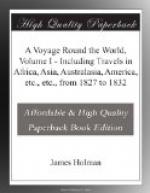have gone with us, for the purpose of assisting in
the capture of any slave-vessel that might be up the
river, but it unfortunately fell calm about 9 o’clock,
when Lieutenant Matson came on board and acquainted
Lieutenant Badgeley that he was afraid the expedition
up the river would detain him longer than he had expected,
and he must therefore relinquish his intentions, and
proceed direct for Fernando Po, in order to obtain
a supply of provisions, of which they had much need.
At noon there was a moderate breeze, and fine clear
weather. East point of the old Calabar N.N.E.
7 miles: but the wind being down the river, we
were employed working up all the afternoon, and having
no pilot on board, we occasionally got rather too
close to the mud banks on either side, and once we
tacked in two fathoms water, which is just as much
as would keep the vessel afloat. She was fortunately
a very beautiful American pilot-boat schooner, that
with the least breeze was as manageable as a boat.
We scaled the guns, and otherwise prepared for action,
for there was no doubt but that any slave-vessel would
resist to the utmost, if there was the least chance
of escape. We were afraid that they might obtain
information of our movements, before we got up to Duke’s
Town, where they generally receive their slaves on
board, for when they are nearly ready for sea, they
always keep a canoe on the look out at the mouth of
the river, to report when any men-of-war appear on
the coast, so that they might have time to disembark
their slaves, before men-of-war, or their boats, can
reach them; for although vessels may be fitted up with
a slave deck, and have every preparation on board for
their reception, you cannot condemn them, unless you
actually find slaves on board.
At 4 the east point of Old Calabar river W.N.W. 7
miles. Anchored at midnight.
Monday, 21.—Unsettled weather and
wind variable. At daylight got under weigh.
At noon light breezes and hazy.
From 4 to 6 this evening we passed between two lines
of fishing-stakes, indeed we found that a number of
large stakes were driven into the mud banks, in different
situations, outside the entrance of the Old Calabar,
some of them a considerable distance from the land;
and there were long lines of them a short distance
from each other.
I endeavoured in vain to find out the reason for placing
these stakes in such situations, many of which were
covered with water at the highest time of the tides.
They are called fishing-stakes, and boats certainly
do sometimes go and make fast to them for that purpose,
as well as to wait the turning of the tide, when they
are going to places at any distance along the coast,
yet one would think that they would hardly take so
much trouble as to bring, and place so great a number
as there are, and many of them several miles from
the land, merely for the above purposes. They
make it very dangerous for boats, or small vessels,
navigating those places in the dark, who are not acquainted




